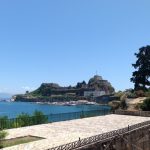The sands of time sift through your hands, grainy as they fall back onto the sparkling beach, clearly distinguishable from the shimmering turquoise water enveloping the massive green peaks that form the Ionian island. This is not the opening scene of “Pirates of the Caribbean 5” or “Prince of Persia 2”, but a place where history is truly written in the sand, a history which shaped the musically intonated language and festive culture of Corfu, Greece. The oddly shaped coastline that offers access to a large bay or inlet for almost every resident certainly attracted mariners of ancient times. In reference to the peaks, the name Corfu is from the Greek “Koryfí̱”, meaning the top of two hills while the Greek name “Korkyra” evokes a mythological nymph. Older names for the island referred to the endless coast or the shape described as a scythe or a harp. It was around 775 BC that Dorian Greeks, known as Phaeacians, settled the land bringing the Ancient Greek language. A few words remain in the modern Corfiot dialect such as the village name Benitses which comes from “Pinio”, a word that meant “a land with rivers” or άστα (pull) from the ancient Greek “stand up”. The subsequent Roman era allowed the island to act independently until the island switched to the Byzantine empire which defended a frenzy of attacks from Vandals, Huns, and Franks with an eclectic set of mercenaries from the Balkans and even Scandinavia. Interestingly, the village of Skripero derives its names from Skrapar in Albania.
When the powerful Venetian navy occupied the island beginning in 1204 AD (given to them for participation in the Crusades), the Corfiot dialect did not resemble Venetian immediately. The idyllic island continued to receive immigrants, this time mostly from the Peloponnese, fleeing Ottoman conquests. This solved a demographic problem but diluted the Venetian Catholic faith into a larger Greek Orthodox community. A Greek despot named Epirus took the island at one point and later Angevins arrived attempting to overturn the decline of Catholicism. Besides the raids, the demographics suffered from plagues, which brought the name Lazaretto for the island across from Corfu (“lazzaretto” meaning “leper house” in Italian). Yet Venice was adamant about making Corfu an economically viable stronghold and by 1386, Venice was in power and influencing the local dialect. Veneto became the official language, promoted by the nobles and only challenged by Cypriot and Cretan refugees who retained Ancient Greek, still at the turn of the 17th century. Directly Italian words include “fanestra” (from “finestra” meaning “window”) and splanada” (esplanade) while other terms may have been deformed by the differences between Veneto and Italian such as “chita” (quiet) from “zitto” and “iezamina” from “esaminante” (examiner). Another place name is Koulines, an industrial suburb, whose name is from “collina” (hill) in Italian. Venice withdrew in 1797 after defending mainly against the increasingly powerful Ottoman empire.
The next solicitor, namely Napoleon who brought infrastructure but also Εφταπαντιέρης (aka political instability) yielded to the Ottomans and a new visitor, Russia during part of his dominion over the island. The British are never far behind the French and an integral word in Corfiot culture and cuisine, Stakofisi, comes from the English “stock fish” (stored fish). It was only in 1864 that Corfu became part of Greece and by 1870 all Italian schools had closed, perhaps clearing the confusion on what language was to be spoken. However, the architecture remains distinctly Italian, a popular dish is called sofrito from “soffrigere” in Italian, and many of the Corfiot-born scholars have other nationalities. Furthermore, there is still linguistic confusion (or diversity) today between North and South Corfu, which the islanders claim is recognizable in the vocabulary and the intonation. Greeks tend to understand, but something like an olive press, for example, “elaiotriveío” in Greek, becomes “loutrouvio” in Corfiot. For outsiders, there is very little information on the Corfu dialect. The most important thing would be to Βαριόμαι* (visit) the Θίναλο (beach) of Corfu and learn the history. Dialects like these aren’t studied because they are endangered; instead, they offer a glimpse into the past, facilitated by the isolation of an island. What gives Αναρίτσιο (goosebumps) is the thought of what dialects will exist one hundred years from now.
*This word may not have the same effect on mainland Greece, due to its translation as “bored”!
For an overview of our translation expertise, visit our vision page.




